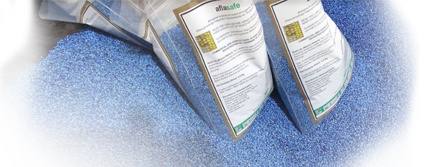First ever Aflasafe for Africa Conference held; private sector leading Aflasafe dissemination, supported by government
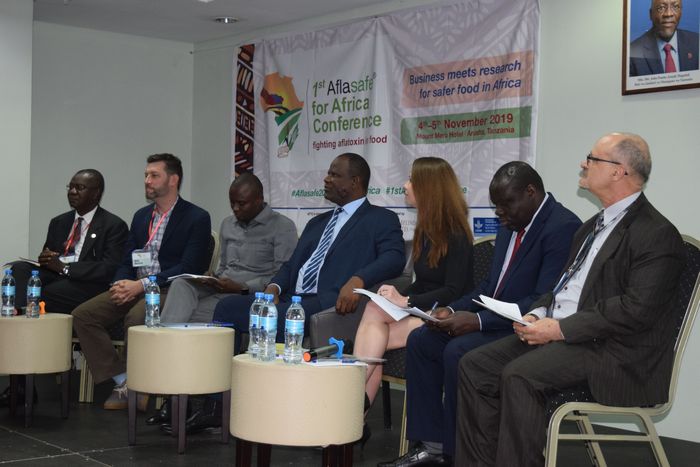
Food safety is a huge global concern that we should all worry about wherever we are, because we all eat food. And in our increasingly interconnected world, food travels across national, regional and continental boundaries, so it is a matter that we should approach in the spirit of all for one, and one for all.
And it is in this spirit that mid this year, the world observed the first ever World Food Safety Day on 7th June 2019, whose theme was Food Safety, everyone’s business. At the time, we renewed our steadfast commitment to continue actively working to make aflatoxin everyone’s business as we help build aflatoxin awareness as our contribution to the universal food-safety agenda. We were also then in full gear preparing for an end-year event that was a first ever, keeping our focus as always on Africa. And so it was that the 1st Aflasafe for Africa Conference, fighting aflatoxin in food was held from 4th to 5th November 2019 in Arusha, Tanzania, with the theme Business meets research, for safer food in Africa, attended by 110 participants from 15 African nations and beyond Africa. They included company CEOs; maize, groundnut and sorghum producer organisations, commodity traders, processors, and other bulk traders; funding agencies, government representatives, regulators and leading food-safety industry players; manufacturing and testing equipment suppliers; and high-level representatives from regional economic communities.
Setting the tone as key discussants were the pioneer private-sector Aflasafe manufacturers who have bravely ventured into Aflasafe as a business at different times, and with whom IITA is partnering in our bid to make aflatoxin poisoning history in Africa’s food. In this joint venture, each partner brings to the table what they each do best: IITA brings its scientifically sound innovative product, Aflasafe, which dramatically reduces aflatoxin contamination, and the private sector brings capital, business acumen and marketing expertise, and established distribution networks.
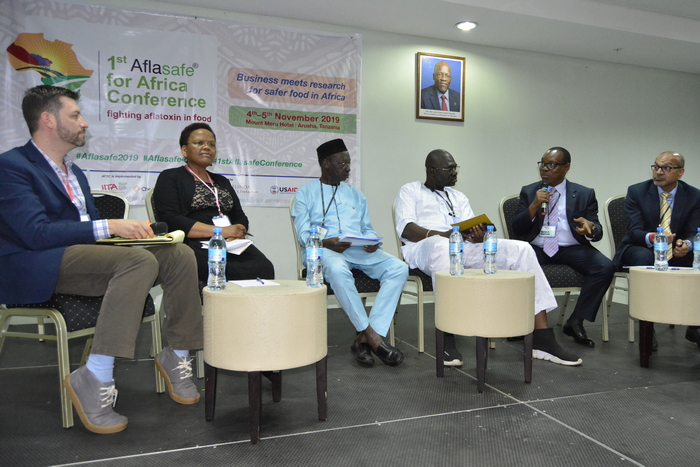
Behind Aflasafe is a mammoth investment of more than a decade-and-a-half of thorough and painstaking product R&D undertaken by IITA and science partners. This means that the commercialisation partners IITA grants manufacturing licences and transfers technology to will not at all invest in product R&D as IITA presents them with tried, tested and duly registered Aflasafe products specifically tailored for their country of business.
But how are these pioneer companies faring? What motivated them to invest in Aflasafe? Having done so, what’s working and what’s faltering? What needs improvement or can be done better? Are other companies across the continent having similar challenges and successes? These and many other questions – and their answers – were presented and discussed in this highly interactive business-to-business two-day conference. Each of the three companies licensed so far presented their journey and its joys and challenges, covering Aflasafe commercialisation in The Gambia, Nigeria, Senegal and the latest entrant this year – Tanzania, the conference’s host country. BAMTAARE Services markets Aflasafe SN01 in – and for – both The Gambia and Senegal and was the first licensee; Harvestfield covers Nigeria with Aflasafe™, our pioneer product, and was the second licensee; while A to Z Textiles Mills Ltd is the latest licensee selected to manufacture and distribute Aflasafe TZ01 in Tanzania.
The conference was opened by the Honourable Japhet Hasunga, Minister of Agriculture, Tanzania, who brought greetings from the President, His Excellency John P Magufuli, and also reaffirmed the President’s commitment to food safety in Tanzania. “What we are celebrating today is the result of many years of collaboration between research organisations at national, regional and international levels. In Tanzania, I know that our scientists – some of whom have served in very key positions in the Ministry of Agriculture – have also worked with IITA and contributed to the development of Aflasafe.”
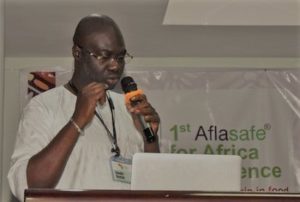
“Senegal is Africa’s leading groundnut exporter, accounting for 3.42% of the world export value” revealed Mr Goulé Guéyé, Managing Director, BAMTAARE Services. And yet, Senegal commands the lowest price among the top five exporting countries in Africa, notably contrasted with Egypt which targets European Union standards for export. “Due to high aflatoxin content and stricter quality standards abroad, Senegal is missing the opportunity to export to international buyers who pay premium prices for groundnuts. This is amongst the reasons why we have invested in Aflasafe, and its local manufacture in Senegal,” Mr Guéyé added. BAMTAARE built the first ever private-sector-owned factory on African soil at Kaolack, Senegal, with maiden Aflasafe SN01 packs rolling off the assembly lines in June 2019.
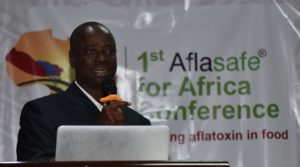
“Nigeria’s export potential was destroyed due to repeated rejections, of which aflatoxin was one of the key culprits,” lamented Mr Abdullahi Ndarubu, Chief Operations Officer, Harvestfield Industries Ltd. “We’re investing in Aflasafe because it aligns with our strategy to expand our crop-protection business portfolio, because aflatoxin is a public-health challenge while also offering a huge market opportunity, and also because, working as closely as we do with the Federal Government, we are witnessing a changing policy environment for the better, with regulatory authorities now paying more attention to aflatoxin, based on data and evidence,” Mr Ndarubu elaborated. By investing in Aflasafe, Harvestfield directly contributes to two critical government drives – Zero Rejection of agricultural produce and The Green Alternative, which seeks to wean the country away from oil to non-oil revenue. Harvestfield is constructing an Aflasafe™ factory in Ogun State, Nigeria.
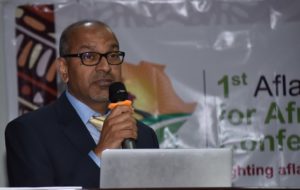
“For us, Aflasafe completes the circle in crop protection,” observed Mr Kalpesh Shah, CEO, A to Z Textile Mills Ltd. “Agricultural inputs, dubbed AgroZ, are the latest in our product portfolio. Aflasafe TZ01 is a good fit in the AgroZ line, since A to Z already markets hermetic-storage AgroZ bags for protecting harvests.” The A to Z Aflasafe TZ01 factory is scheduled for completion by the end of 2019, in time to supply Aflasafe for Tanzania’s 2020 cropping season.
In the space of just two years since commercialisation began in 2017, the three private-sector Aflasafe commercialisation partners selected have collectively invested a combined total of USD 4.4 million, after signing Aflasafe Technology Transfer and Licensing Agreements (TTLAs) with IITA in September 2017 (BAMTAARE Services), March 2018 (Harvestfield) and May 2019 (A to Z).
With Aflasafe commercialisation partners setting the stage by giving the opening presentations to centre further discussions on ground-truth reality, other critical business sessions that followed included:
- Creating enabling policies for sustainable scaling up
- How to scale innovations with economic and social impact: what matters most? Is it the innovation itself or the marketing strategy?
- The latest on Aflasafe technology advancements
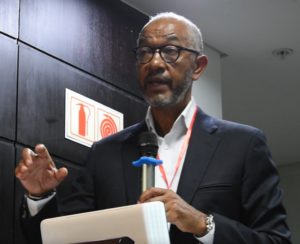
Particularly insightful was sound advice from Mr Frank Braeken, former President, Unilever Africa that even for business, Aflasafe is hardly business as usual and is in fact business most unusual, meaning a standard and traditional marketing approach will not do. “Marketing Aflasafe successfully calls for a clear vision including clarity of purpose, since Aflasafe is a unique product unlike any other. Clarity of purpose in turn helps align the marketing strategy. Because while it is difficult to motivate people with a product, you can motivate them with a purpose. Your product is the hero: what is it that Aflasafe does in the daily lives of people? Mr Braeken posed. He clarified that while factual and important, for marketing purposes, preventing aflatoxin is not the key message: it must be about the health of African lives and children. “We must tap into the emotional side in our messaging, and should in fact be upset at the slow adoption of Aflasafe, knowing as we do that the impacts of aflatoxin are wholly preventable,” he urged. Mr Braeken is also a member of the Alliance for a Green Revolution in Africa (AGRA) Board.
These rich preparatory and participative plenary sessions culminated in breakout, in-depth, country-specific roundtable discussions covering a dozen countries – Burkina Faso, The Gambia, Ghana, Kenya, Malawi, Mozambique, Nigeria, Rwanda, Senegal, Sudan, Tanzania and Uganda. The country discussions were a structured brainstorm around challenges or priorities to accelerate Aflasafe scale-up; solutions and workplan from 2020; and how the regional economic communities could assist in overcoming the challenges and accelerating scale-up.
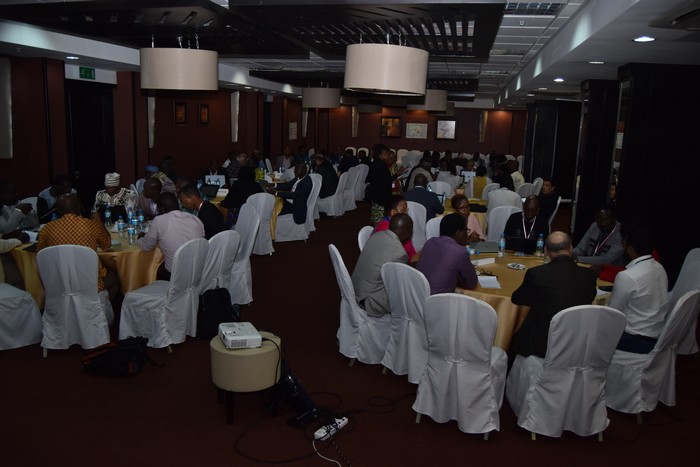
Looking back, it’s been an eventful and fruitful odyssey: the Aflasafe journey began in 1995, with initial research in Nigeria. Nearly quarter-of-a-century later, today, Aflasafe is present in a total 19 countries, of which it is on sale or available in seven, registered in two, and at various stages of product development in 10. By September 2019, a total of 3,156 metric tonnes of Aflasafe had been sold over three years, covering 315,620 hectares.
“In the last five years, we have been grappling with how to choose the right partners, stated Mr Orin Hasson, Senior Investment Officer, Bill & Melinda Gates Foundation, who has been personally involved in Aflasafe over the last 10 years, when product development was still at basic science. “We are now in transit to a new phase over the next five years, where IITA moves to a support role while the private sector takes the lead in Aflasafe manufacturing and marketing facilitated by IITA’s Aflasafe Technology Transfer and Commercialisation initiative, and governments mainstreaming Aflasafe into their programmes, considering the nature of the solution,” Mr Hasson projected.
“Many here, have contributed to the development of Aflasafe,” said Ms Terhi Majanen, Director of the United State Agency for International Development’s Economic Growth Office in Dar es Salaam, Tanzania, adding that the government now has a critical role to play to formulate transparent policies that induce the private sector to make long-term investments in fighting aflatoxin.
And while lauding the notable progress made, Dr Kenton Dashiell, IITA Deputy Director General, Partnerships for Delivery said, “We have a lot more to achieve to fight aflatoxin. We are only 0.001% of the way there. But projecting 20 years into the future, will we be able to tell our grandchildren about our work on aflatoxin and that it is now no longer a problem?”
Clearly, though much has been done, there is much, much more that remains to be done if we’re to win the fight against aflatoxin in Africa’s food. And so, we at IITA and our partners in the funding, intergovernmental, public and private sectors say A luta continua! No doubt, the task ahead is immense, but we’re not daunted, standing as we do shoulder-to-shoulder with such able partners willing to put their money, time and other resources to help win this noble life-and-death fight against this stealthy killer poison in our food.
And so what next for the Aflasafe forum that this inaugural continental conference was? For that, we turned to participants to give us their own candid appraisal, as the impartial judges. The verdict? From a handsome 54% response rate, which greatly pleased us, 70% found the two-day length appropriate, and 85% are highly likely to attend a similar Aflasafe for Africa Conference in the future, and the remaining 15% somewhat likely. Nobody responded with ‘unlikely’ or ‘never again’. With that ringing endorsement, and the dynamism, commitment, sense of mission and momentum witnessed at the conference, the future appears bright for renewed and concerted efforts in Africa’s multi-front fight against aflatoxin in food. Meantime, we’ll continue bringing you more details from the Conference as 2020 unfolds, so please watch this space.
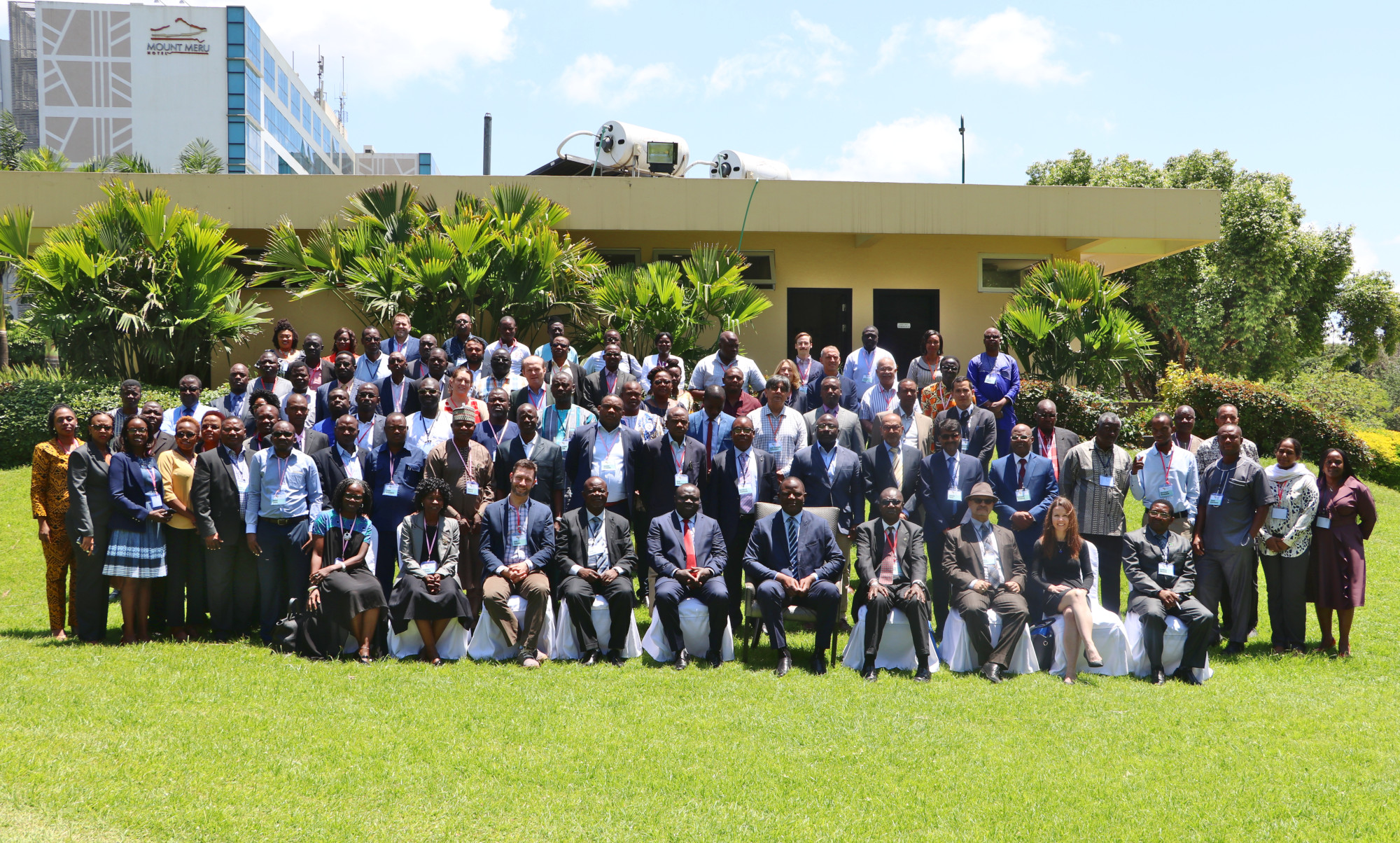
LINKS
- Feel like you were there! Conference presentations
- More on the Conference
- Conference press release
- Aflasafe commercialisation brief and short video tracing Aflasafe’s journey
- Commercialising Aflasafe in Africa: our approach and reach

